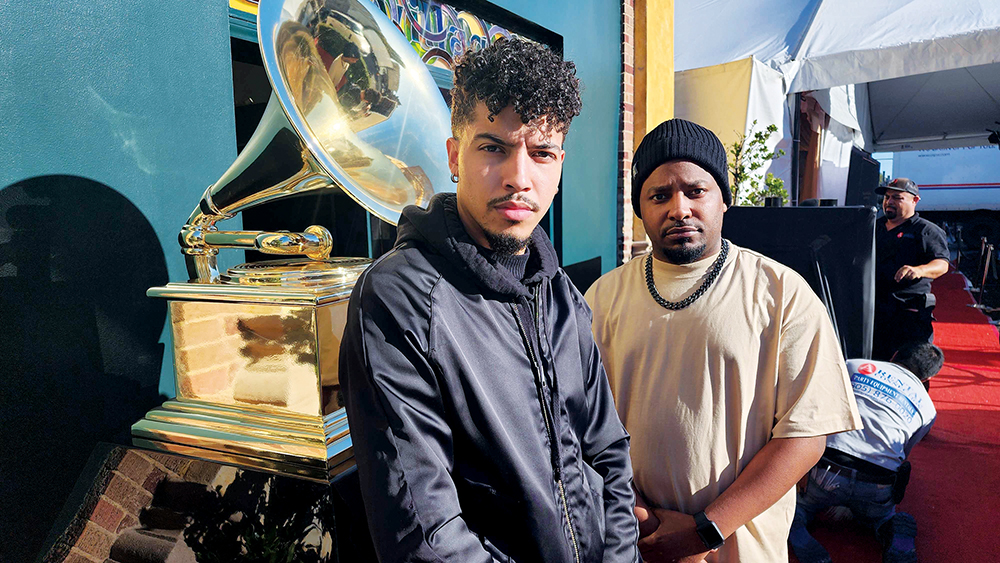Grammy Week, the star-studded run-up to the Recording Academy’s nationally broadcast awards show every February, is long over, but this year a new event was initiated that many Memphis artists are still mulling over. And while it centered on the behind-the-scenes work of songwriting and producing, the collaborations that flowered at the event may well bear fruit to be heard on radios everywhere before long.
This workshop was more than your typical song swap by players with acoustic guitars. It involved some of the most influential producers in the business, including native Memphians Ebonie Smith, a staff producer/engineer for Atlantic Records, and YoJi (aka YoJi Roby), a producer and artist at Twenty5Eight Entertainment.
Gebre Waddell, CEO of the Memphis-based music credit platform Sound Credit, which organized the workshop, describes the impetus for the gathering as being almost serendipitous. “Sound Credit was one of several sponsors for the producers and engineers event for this year’s Grammy Week. [Memphis singer-songwriter] Brandon Lewis and I were on a call trying to think that through, and we spontaneously came up with this idea of doing a songwriting event throughout the rest of the week. At first it was just two people on a phone call, but as we started reaching out to people, we realized that this was something beyond.”
Upon seeing that vision made a reality, Lewis, director of The Consortium MMT and a songwriter signed to Atlantic Records, was deeply moved by its potential. “I was extremely proud,” he says. “I felt liberated when I looked around and saw so many Memphis singer-songwriters in the room during this memorable week. I was like, ‘This is the real deal. This is how it should be!’ A lot more talent should be deployable from our city.”
In a week usually filled with more celebratory gatherings around Los Angeles, this was an event with more practical implications. “People are out there looking for things to do during Grammy Week,” says Waddell, “so when an option comes up to actually do your craft, to work with other people, it’s a very attractive thing for folks. We witnessed the power of it firsthand.”
By all accounts, the 20-odd participants were working at a fast clip, ultimately creating half a dozen song demos over two days. Their prolific output, Lewis explains, grew from the way the workshop was organized. “I tried to keep it very production-centered,” he says. “Once we can hear something, our emotions and vibes start gravitating towards something productive, thinking about lyric lines, concepts. So on both days, I had Ebonie and YoJi working on production. We were limitless when it came to music. I let them do their thing, and then the other producers there would chime in on the work.”
Working with Lewis and the two lead producers were a number of Memphis-related songwriters and rappers, including Tyke T, B Sims, Lil Rudy, and St.Courts. Other artists like D.Lew, AJ Haynes, and AMG Paper also participated, and, as Lewis describes it, the meeting of minds yielded some unexpected results. “With the first song, for example, I started by cutting the vocals; then one of our vocalists showed up, and I immediately had him cut vocals. That way, I could go back to writing, which is where I needed to be. Whatever serves the song! Then we added samples and other parts. To share our work, we used the Notes feature on our phones, which could color code who wrote what. Once we got started that way, you’d get different perspectives from different creators, which is why I loved doing the writing camp so much. We even had rappers working on pop records. You never know what you’re going to get out of it.”
Indeed, it was deemed so successful that Waddell foresees it becoming an annual event. And Lewis is ready to keep it rolling. “The energy around the writing camp was very impactful,” he muses. “What’s come out of it now are the relationships we’ve been able to curate, from Memphis to L.A. None of those artists had been exposed to a major connection with major labels, until we gave them a chance to work with these producers.”

